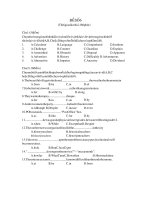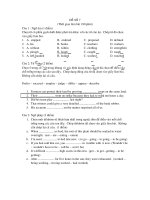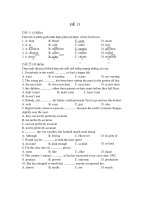Đề thi thử đại học môn anh văn 107
Bạn đang xem bản rút gọn của tài liệu. Xem và tải ngay bản đầy đủ của tài liệu tại đây (79.19 KB, 5 trang )
I. Choose the best answer to complete the sentence.
Question 1. Despite playing under strength, the village team _____ beat the rivals.
A. could B. were able to C. couldn’t D. weren’t able to
Question 2. I suggest Andrea ______ in touch with the organizers.
A. should get B. to get C. getting D. gets
Question 3. The traffic lights _____ green and I pulled away.
A. became B. turned C. got D. went
Question 4. ______ during the storm.
A. They were collapsed B. The fence was collapsed C. They collapsed the fence D. The
fence collapsed
Question 5. The suspect confessed _______.
A. his crime B. the police his crime C. his crime to the police D. his
crime the police
Question 6. ______ thinks that Judith should be given the job.
A. Neither of us B. The majority of my colleagues C. Practically everyone D. A number
of people
Question 7. We had ______ holiday in Spain.
A. a two week’s B. two weeks C. two-week D. a two-week
Question 8. The company owns _____ in the city centre.
A. a cars park B. several car parks C. a car park D. several cars parks
Question 9. The government has introduced _______.
A. a children’s clothes tax B. a tax on children clothes C. a children clothes tax D. a tax on
children’s clothes
Question 10. I’ll be with you in _______.
A. one quarter of an hour B. a quarter of an hour C. a quarter of one hour D. a quarter of
hour
Question 11. _____ my friends knew I was getting married.
A. Not much of B. not many of C. Not much D Not many
Question 12. ____ the children _____ awake.
A. None of/was B. Not any of/were C. No /was D. None
of/were
Question 13. The party was excellent, and I’d like to thank all the ______.
A. concerned people B. responsible people C. people that concerned D. people
concerned
Question 14. I asked Francis to clean the car, and he did ______.
A. a well job B. the job good C. a good job D. a job well
Question 15. ______, they slept soundly. A. Hot though was the night air B. Hot though the night
air was
C. Hot the night air as was D. Hot although the night air was
Question 16. John was the first person I saw _____ hospital.
A. by leaving B. on leaving C. in leaving D. on to leave
Question 17. He suddenly saw Sue ____ the room. He pushed his way ____ the crowd of people to get to
her.
A. across/through B. over/through C. across/across D. over/along
Question 18. She tried to _______.
A. talk me the plan out of B. talk out of me the plan C. talk me out of the plan D. talk out me
of the plan.
Question 19. _____ that Marie was able to retire at the age of 50.
A. So successful her business was, B. So successful was her business,
C. Her business was successful D. So was her successful business,
Question 20. I’m _____ a complete loss to understand why you reacted so violently.
A. at B. in C. on D. by
Question 21. From an early age, Wolfgang had a(n) ____ for music.
A. interest B. passion C. involvement D. tendency
Question 22. Financial help from his parents ______ James to complete his studies.
A. granted B. provided C. eased D. enabled
Question 23. I don’t take ____ to being disobeyed. That’s a warning!
A. well B. kindly C. gently D. nicely
Question 24. I like that photo very much. Could you make an _____ for me?
A. increase B. enlargement C. extension D. expansion
Question 25. I’m becoming increasingly _____ . Last week, I locked myself out of the house twice.
A. oblivious B. mindless C. absent D. forgetful
II. Pick out the word whose underlined part is pronounced differently from that of the others.
Question 26. A. south B. southern C. scout D. drought
Question 27. A. dome B. comb C. home D. tomb
III. Pick out the word whose stressed syllable is different from that of the others.
Question 28. A. literature B. preventive C. measurement D. temperature
Question 29. A. example B. continue C. sensible D. contestant
Question 30. A. constant B. magnetic C. sensitive D. atmosphere
IV. Choose the best answer.
Question 31. Would you like some more tea? - _______________________
A. No, thank. B. Yes , thanks. C. Yes, please. D. No, please.
Question 32.Will it rain on the day of our departure? - _____________________
A. I hope not. B. I don’t hope so C. I hope not so. D. I hope it
wouldn’t.
Question 33. -Remember to return the newspaper to my father. - ______________
A. I will B. Why not C. I won’t D. Of course.
Question 34.Will you have time to help us? - ______________ I’m very busy at the moment.
A. I’m afraid not B. I think so. C. I don’t expect so. D. I hope not.
Question 35. “I’d like the blue jacket, pleases! Can I try it on?” – Yes, _______________ “
A. you would B. you must C. certainly D. you do
V. Read the passage and the questions or unfinished sentences, then choose the best answer for each.
A solar eclipse occurs when the Moon moves in front of the Sun and hides at least some part of the Sun
from the earth. In a partial eclipse, the Moon covers part of the Sun; in an annual eclipse, the Moon
covers the center of the Sun, leaving a bright ring of light around the Moon; in a total eclipse, the Sun is
completely covered by the Moon.
It seems rather improbable that a celestial body size of the Moon could completely block out the
tremendously immense Sun, as happens during a total eclipse, but this is exactly what happens. Although
the Moon is considerably smaller in size than the Sun, the Moon is able to cover the Sun because of their
relative distances from Earth. A total eclipse can last up to 7 minutes, during which time the Moon’s
shadow moves across Earth at a rate of about 6 kilometers per second.
Question 36. This passage mainly _____. A. describes how long an eclipse will last. B. gives facts about
the Moon.
C. explains how the Sun is able to obscure the Moon. D. informs the reader about solar
eclipses.
Question 37. In which type of eclipse is the Sun obscured in its entirety?
A. A partial eclipse B. An annual eclipse C. A total eclipse D. A celestial
eclipse
Question 38. The word ring in line 3 could be best replaced by ______.
A. piece of gold B. circle C. jewel D. bell
Question 39. A celestial body in line 5 is most probably one that is found ______.
A. somewhere in the sky B. within the Moon’s shadow C. on the surface of the Sun D. inside
Earth’s atmosphere
Question 40. What is the meaning of block out in line 5?
A. Square B. Cover C. Evaporate D. Shrink
Question 41. According to the passage, how can the Moon hide the Sun during a total eclipse?
A. The fact that the Moon is closer to Earth than the Sun makes up for the Moon’s smaller size.
B. The Moon can only obscure the Sun because of the Moon’s great distance from the Earth.
C. Because the Sun is relatively close to Earth, the Sun can be eclipsed by the Moon.
D. The moon hides the Sun because of the Moon’s considerable size.
Question 42. The word relative in line 8 could best be replaced by ________.
A. familial B. infinite C. comparative D. paternal
Question 43. The passage states that which of the following happens during an eclipse?
A. The Moon hides from the Sun. B. The Moon is obscured by the Sun.
C. The Moon begins moving at a speed of 6 kilometers per second. D. The Moon’s shadow
crosses Earth
Question 44. The word rate in line 9 is closest in meaning to ______.
A. form B. speed C. distance D. rotation
Question 45. Where is the passage does the author mention the rate of a total eclipse?
A. Lines 1- 2 B. Lines 2- 4 C. Lines 5-6 D. Lines 8-9
VI. Read the text below and choose the word that best fits the space. EXAM ADVICE
In Part Three of the Speaking Section you work with a partner. You have to do a (46)____ task which
usually (47)____ about 3 minutes. One possible task is “ problem (48) ____”, which means you have to
look at some (49)____ information and then (50)____ the problem with your partner. You maybe show
photos, drawings, diagrams, maps, plans, advertisements or computer graphics and it is (51)____ that you
study them carefully. If necessary, check you know exactly what to do by (52)_____ asking the examiner
to (53)____ the instructions or make them clearer.
While you are doing the task, the examiner will probably say very (54)____ and you should ask your
partner questions and make (55)____ if he or she is not saying much. If either of you have any real
difficulties the examiner may decide to step in and (56) ____ . Normally, however, you will find plenty to
say, which helps the (57)____ to give you a fair mark. This mark depends on your success in doing the
task by (58) ____ with your partner, which includes taking (59)____ in giving opinions and replying
appropriately, although in the end it may be possible to “agree to (60)_____”.
Question 46. A. single B. lonely C. unique D. once
Question 47. A. exists B. lasts C. stays D. maintains
Question 48. A. solving B. working C. making D. finding
Question 49. A. optical B. obvious C. noticeable D. visual
Question 50. A. argue B. discuss C. talk D. have
Question 51. A. essential B. needed C. helpful D. successful
Question 52. A. formally B. officially C. politely D. sincerely
Question 53. A. insist B. copy C. tell D. repeat
Question 54. A. little B. much C. few D. many
Question 55. A. ideas B. statements C. speeches D. suggestions
Question 56. A. complain B. help C. suggest D. fail
Question 57. A. judge B. referee C. assessor D. observer
Question 58. A. competing B. struggling C. opposing D. co-operating
Question 59. A. changes B. sides C. turns D. sentences
Question 60. A. contrast B. disagree C. argue D. object
VII. Find the underlined part that needs correcting.
Question 61. The first (A) national park in world (B), Yellowstone National Park, was (C) established
in (D) 1872.
Question 62. Animation is a technique (A) for creativity (B) the illusion of lifeC. in inanimate things(D).
Question 63. Scientists at universities (A) are often more involved (B) in theoretical research than (C) in
practically(D) research.
Question 64. Benjamin Franklin’s ability (A) to learn from observation and experience contributed
greatly(B) to him(C) success in (D) public life.
Question 65. The surface of the (A) tongue covered (B) with tiny(C) taste buds (D).
VIII. Read the following passage then choose the best answer to the questions below.
Most people think of deserts as dry, flat areas with little vegetation and little or no rainfall, but this is
hardly true. Many deserts have varied geographical formations ranging from soft, rolling hills to stark,
jagged cliffs, and most deserts have a permanent source of water. Although deserts do not receive a high
amount of rainfall – to be classified as a desert, an area must get less than twenty-five centimeters of
rainfall per year – there are many plants that thrive on only small amounts of water, and deserts are often
full of such plant life.
Desert plants have a variety of mechanisms for obtaining the water needed for survival. Some plants,
such as cactus, are able to store large amounts of water to last until the next rainfall. Other plants, such as
the mesquite, have extraordinarily deep root systems that allow them to obtain water from far below the
desert’s arid surface.
Question 66. What is the main topic of the passage?
A. Deserts are dry, flat areas with few plants. B. There is little rainfall in the desert.
C. Many kinds of vegetation can survive with little water. D. Deserts are not really flat areas with
little plant life.
Question 67. The passage implies that ____________.
A. the typical conception of a desert is incorrect. B. all deserts are dry, flat areas.
C. most people are well informed about deserts. D. the lack of rainfall in deserts causes the lack
of vegetation.
Question 68. The passage describes the geography of deserts as ________.
A. flat B. sandy C. varied D. void of vegetation.
Question 69. The word source in line 3 means _____. A. supply B. storage space C. need D. lack
Question 70. According to the passage, what causes an area to be classified as a desert?
A. The type of plants B. The geographical formations
C. The amount of precipitation D. The source of water
XI. Choose the sentence which is closest in meaning to the one in italics.
Question 71. You’re not to blame for what happened.
A. You’re not accused of what happened. B. What happened is not your fault.
C. You’re responsible for what happened. D. We blame you for what happened.
Question 72. He can hardly see at all without glasses.
A. He can see without glasses. B. He can see even if he doesn’t wear
glasses.
C. He can’t see everything without glasses. D. He is practically blind without
glasses.
Question 73. The concert wasn’t as good as we had expected.
A. The concert wasn’t so good as we had seen. B. We expected the concert to be worse.
C. We thought the concert would be much better. D. The concert was thought to be as
good.
Question 74. Please don’t ask her to the party.
A. I’d rather you didn’t invite her to the party. B. I’d rather not ask her to the party.
C. Please don’t ask her about the party. D. You ask her to the party, don’t you?
Question 75. She broke down the moment she heard the news.
A. She was broken for a moment when she heard the news. B. She broke her leg when
hearing the news.
C. On hearing the news, she broke down. D. When she heard the news,
she was sick.
Question 76. Strong as he is, he still can’t lift that box.
A. The box was too heavy for him to lift. B. He’s very strong, but he still can’t lift
that box.
C. He still can’t lift that box because he’s not as strong. D. However he is strong, he still can’t
lift that box.
Question 77. I wish we had gone somewhere else for the holiday.
A. If only we went somewhere else for the holiday. B. It’s a pity we didn’t go there for the
holiday.
C. If we had gone for the holiday, I would have gone somewhere else.
D. I regret not having gone somewhere else for the holiday.
Question 78. You should have had your eyes tested a long time ago.
A. You haven’t had your eyes tested though it’s necessary.
B. Your eyes should be tested a long time ago. C. You had your eyes tested a long time ago.
D. It’s a long time ago since you had your eyes tested.
Question 79. A child is influenced as much by his schooling as by his parents.
A. Schooling doesn’t influence a child as much as his parents do.
B. A child’s parents have greater influence on him than his schooling.
C. A child can influence his parents as much as his schooling.
D. A child’s schooling influences him as much as his parents do.
Question 80. Rarely has a 15-year-old earned so much money.
A. 15-year-old rarely earns money. B. A 15-year-old rarely earns lots of money.
C. A 15-year-old has seldom earned that much money. D. A 15-year-old has never earned that
much money.
THE END









